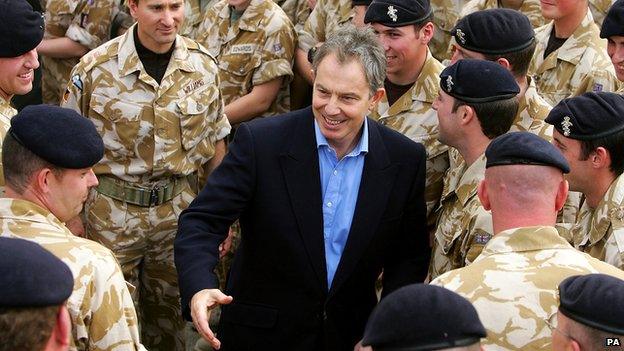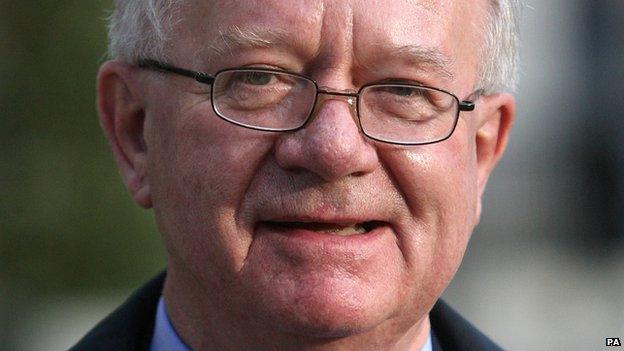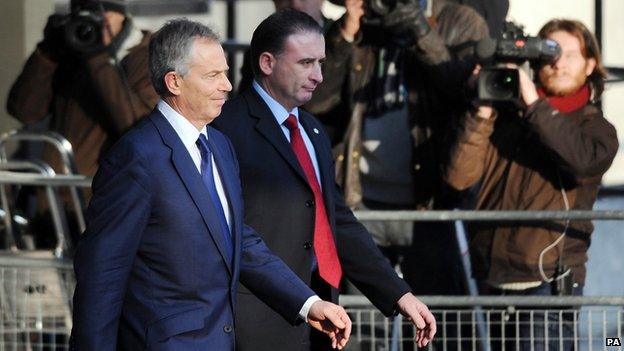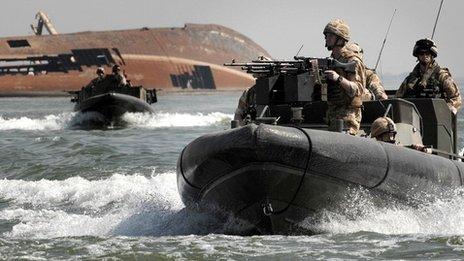Sir John Chilcot's Iraq War inquiry wait continues
- Published

The four-year wait for the publication of an official inquiry into the 2003 Iraq War, headed by Sir John Chilcot, is unlikely to end any time soon. Here, we look at what it is all about and the reasons for the hold-up.

What is the remit of the inquiry?
To look at the UK's role in the Iraq War between 2001 and 2009. This includes the decision to go to war, whether troops were properly prepared, how the conflict was conducted and the planning for its aftermath. Some 179 British service personnel were killed there between 2003 and 2009, and tens of thousands of Iraqi civilians died, though estimates vary considerably.
Sir John has said he will not shirk from apportioning blame where he sees fit.

When was it supposed to report?
When the inquiry ended in February 2011, Sir John said it would be "some months" before the final report was published. Four years later, frustrated MPs pressed him for a date. But he refused to give one, saying he did not want to "arouse false hopes". There was no prospect of anyone seeing the report before the general election on 7 May, he said. Most recently, sources close to the inquiry told BBC Newsnight: "Nobody thinks it will come out this year."

Why the delay?
Sir John has blamed several factors for the hold-up:
"under-estimating" the time it would take to study up to 150,000 documents
the work being "unprecedented in scope" and the report likely to contain a million words
the time needed to allow key figures criticised in the report the right to respond
A further factor was the death of one of the inquiry's five panel members - historian Sir Martin Gilbert - following a long illness.
Tony Blair, the Labour prime minister who sent troops into Iraq, denied he was to blame for the report's slow progress. Washington also got the blame in media reports, but the Cabinet Office said it had no power to veto the disclosure of communications between Mr Blair and his then US counterpart, George W Bush.

What has it cost?
Some £9,016,500, so far - according to the Iraq inquiry website, external.


Sir John, a former civil servant, chaired the five-member panel
How much is Sir John Chilcot paid?
He is paid £790 per day. His committee members are on £565 per day, according to the Iraq inquiry website., external

Who gave evidence?
It was a roll-call of Labour's big beasts: Tony Blair; his chancellor Gordon Brown; former foreign secretary Jack Straw; former defence secretary Geoff Hoon and former international development secretary Clare Short. Others included former UN weapons expert Hans Blix, a Foreign Office lawyer who quit in protest at the war, senior diplomats, civil servants and military commanders.

Did witnesses testify on oath?
No. Instead they were asked to sign a piece of paper saying they would give a "full and truthful" account of events.

Tony Blair made two appearances before the panel

What were the inquiry's key moments?
All eyes were on Tony Blair at his first appearance in February 2010. Saddam Hussein was a "monster", he said. He accepted responsibility for leading the UK to war, but had no regrets. Less than a year later, he was recalled. He insisted disarming Iraq - not regime change in itself - was the reason for sending in troops. He denied giving private assurances to then US President Bush that the UK would take part in military action. Second time around, however, Mr Blair offered his "deep and profound regret" for the loss of life.
Jack Straw insisted regime change was "never" the goal of UK policy towards Saddam Hussein. If the former Iraqi leader had complied with UN disarmament demands, he would have remained in power, he said.
Former head of the armed forces Admiral Lord Boyce said the Treasury had to be "beaten over the head" to deliver on Labour's cash promises. "Half the cabinet" did not think the country was even at war, he added.

Where's the controversy?
Critics of the war say Mr Bush effectively decided to forcibly remove Saddam Hussein by the middle of 2002. They say the UK knew this and offered to help. In his evidence, the UK's man in Washington at the time - Sir Christopher Meyer - highlighted a private meeting between President Bush and Mr Blair in April 2002, after which Mr Blair began to talk publicly about regime change. Sir David Manning, Mr Blair's foreign policy adviser, said he had signalled his intention to back regime change but urged Mr Bush to get UN authorisation. Alastair Campbell, ex-No 10 communications director, said Mr Blair wrote private notes to Mr Bush during 2002 suggesting the UK would ultimately take part in military action if diplomatic efforts failed.

The Iraq Inquiry
finished gathering evidence
3 years
ago, after being launched in 2009
-
Witnesses cross-examined: 129
-
Estimate of total words spoken in evidence: 2.5 million
-
Documents studied: 150,000
-
Projected total cost: £10m
This is not the first inquiry into Iraq, is it?
No. There have been four others. In 2003, the Commons Foreign Affairs Committee and the joint Parliamentary Intelligence and Security Committee both looked into the intelligence used to justify the war. The Hutton inquiry, in January 2004, examined the circumstances surrounding the death of scientist and weapons adviser Dr David Kelly. The Butler inquiry, later that same year, looked again at intelligence used to justify the war.

Who ordered this one?
Former Labour Prime Minister Gordon Brown in 2009.
- Published5 July 2016
